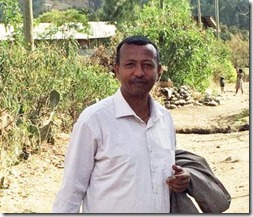Without saying a word, the man stared at Opalka and then at the apple and the knife, which were still in his hands. Opalka put the paper down on the seat beside him and held out both arms, motioning with his fingers for the man to pass him the apple and knife. The man beamed and handed him both fruit and knife. Then he wiped one hand on the other and went to his small suitcase. He rummaged around in it some more, while Opalka watched with the knife and apple still in his hands. Finally, the man took out a travel guidebook on Warsaw, in English, and two black notebooks, visibly well-used. He returned to his seat beside Opalka, noisily flipping through the guidebook. He thumbed through the pages, back and forth, but didn’t seem to find what he was looking for. Now and then, he clicked his tongue and grunted incomprehensibly in an unidentifiable language. Finally, he closed the book in disgust and placed it on the seat, right on top of Opalka’s newspaper. He crossed his legs and took up the two black notebooks. He thumbed through one. He thumbed through the other. He again picked up the first one, this time turning the pages more slowly, before stopping at one. A huge grin spread across his face, which had been growing increasingly dispirited. He turned to Opalka and was about to speak, when he realized that Opalka was still holding the apple and knife. The man, who was holding the black notebook in his right hand, held out his left hand to take back the apple and knife. Opalka gave him the apple, but couldn’t hand him the knife because the man’s hand was very small, and couldn’t hold both things at once. The man returned the apple to Opalka and laid the notebook on his lap. To keep it open at the page he was interested in, he laid the other black notebook across it. Once he’d done this, he took back the apple and knife. He turned to Opalka and, reading from the notebook, said in Polish:
“Would you like some, sir?â€
Opalka smiled and thanked him, also in Polish:
“That is very kind of you, but no. Thank you very much.â€
Then he tugged at the newspaper, which was on the seat under the guidebook, and tried to continue reading. The man, in turn, peeled the entire apple before cutting it into small pieces, which he put in his mouth and chewed happily. Opalka could not get past one page — he had already read the same paragraph three times — because the noise of the man’s chewing distracted him. He attempted, for the fourth time, to understand what was written when he was startled by a new commotion. The man, who had just found a worm in his apple, had stood up to lob the fruit and knife onto the empty tracks, as he shouted, furious, in his own language:
“A worm! Yuck!â€
He walked to the edge of the platform and spat the lump of chewed apple out onto the rails.
Opalka could not get past one page — he had already read the same paragraph three times — because the noise of the man’s chewing distracted him.
“Yuck! Yuck! Yuck!â€
Finally, he stuck the middle finger of his right hand down his throat and tried to make himself throw up, unsuccessfully. He was preparing to repeat this action, when Opalka, who had been watching it all in disbelief, tried to avoid an unpleasant outcome and told him in Portuguese:
“Don’t do that. There’s no need. A little worm in your apple won’t do you any harm.â€
The man stopped. Stunned, he turned to Opalka and said, now in Portuguese:
“You speak Portuguese! Why didn’t you tell me before?â€
“Because I didn’t know you spoke Portuguese,†Opalka replied. “How could I have guessed?â€
“You know…â€
The noise of the train pulling into the station muffled the man’s voice, which prevented Opalka from hearing the end of his sentence. When the train stopped, Opalka said (from then on always in Portuguese):
“Our train’s arrived.†And, given the large number of suitcases the man was carrying, asked him: “May I help you?â€
The man thanked him for the offer, but rejected his assistance. Opalka picked up his small trunk and the basket with the eleven lemons, where he had also placed the newspaper, and boarded the train. From inside his compartment, he looked out the window and watched the man drop the four suitcases on the ground. He tried to pick up the two largest, holding the smaller ones under his short, stocky arms, but it didn’t work. When he bent down to grab the larger suitcases, the smaller ones would invariably fall. Opalka placed the crumpled newspaper in the breast pocket of his white summer suit and got off the train. He went up to the man and said:
“Let me help you.â€
Without giving the man time to reply, he took one small suitcase and one large suitcase and boarded the train. The man, who could not stop thanking him, also boarded the train, carrying the other two suitcases. Opalka let him go ahead and then followed him to his compartment. There, he placed the two suitcases he had helped carry onto the luggage rack overhead. The man tried to do the same, but his short arms couldn’t reach that high. Opalka took the two remaining suitcases and placed them alongside the others. Then he extended his right hand to the man and said goodbye, wishing him a pleasant trip. The man shook his hand effusively, returning his kind wishes. Opalka then went to his compartment. Upon arriving, he took off his hat and sat down next to the window. He retrieved his newspaper from his jacket pocket, gave it a shake in a futile attempt to smooth it out, then resumed reading, waiting for the train to depart.
Â




